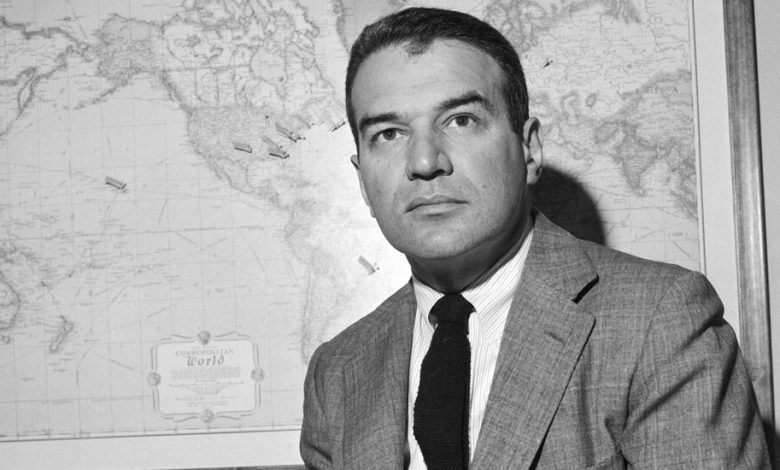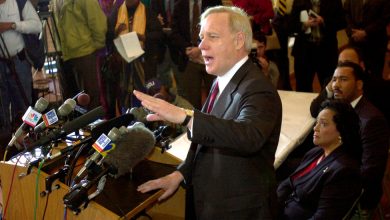Bernard Kalb, Veteran Foreign Correspondent, Is Dead at 100

Bernard Kalb, a veteran correspondent for CBS, NBC and The New York Times who also made a brief and unhappy foray into government as a State Department spokesman, died on Sunday at his home in North Bethesda, Md. He was 100.
His death was confirmed by his daughter Claudia Kalb, who said his health had declined after a fall on Jan. 2.
In his many years on television, Mr. Kalb’s sonorous voice, thick eyebrows and command of detail became familiar to millions of viewers. He covered wars, revolutions and the diplomatic breakthroughs that presaged the end of the Cold War.
He reported for The Times from 1946 to 1962, for CBS during the next 18 years (during which he joined his brother, Marvin, on the diplomatic beat) and as NBC’s State Department correspondent from 1980 to 1985. Then, for nearly two years, he served in the Reagan administration’s State Department — a stint that ended contentiously.
As a CBS correspondent in 1972, Mr. Kalb accompanied President Richard M. Nixon on the trip to China that proved to be a major step in the normalization of relations between the two nations. He also made virtually every overseas trip with Henry A. Kissinger, Cyrus R. Vance, Edmund S. Muskie, Alexander M. Haig Jr. and George P. Shultz during their tenures as secretary of state.
“You have a sense of being something of an eyewitness to the evolutions and eruptions of the decades since World War II,” Mr. Kalb said in November 1984 when President Ronald Reagan announced his appointment as assistant secretary of state for public affairs. It was the first time a journalist who had covered the State Department became its spokesman.
But Mr. Kalb resigned in October 1986 to protest what he called a “reported disinformation program” — he stopped short of confirming its existence — conducted by the administration against the Libyan leader Col. Muammar el-Qaddafi.
The Washington Post reported that the program included plans to plant false reports in the press about internal opposition to Colonel Qaddafi and American military plans against Libya. Asked about Mr. Kalb’s resignation, Mr. Reagan said, “No one on our side has been lying to anyone.”
“My resignation does not endow me with sudden freedom to act on what may be or not be secret and what can be classified or what cannot be classified,” Mr. Kalb said. But he added, “You face a choice — as an American, as a spokesman, as a journalist — whether to allow oneself to be absorbed in the ranks of silence, whether to vanish into unopposed acquiescence or to enter a modest dissent.”
Bernard Kalb was born in Manhattan on Feb. 4, 1922, His parents, Max and Bella (Portnoy) Kalb, were immigrants — his father from Poland and his mother from what is now Ukraine. The family moved to Washington Heights when Bernard was a teenager. His father worked principally as a tailor in the garment district, but at nights he also did tailoring at a dry cleaner in Washington Heights that his mother ran by day.
After graduating from the City College of New York in 1942, Mr. Kalb spent two years in the Army, mostly working on a newspaper published out of a Quonset hut in the Aleutian Islands of Alaska. His editor was Sgt. Dashiell Hammett, the author of the detective novels “The Maltese Falcon” and “The Thin Man.”
In 1946, Mr. Kalb joined The Times. He originally wrote for the radio station WQXR, which at the time was owned by the company. He went on to write for the newspaper; he was a metropolitan reporter and covered the United Nations before being sent to Southeast Asia as a correspondent.
His first overseas assignment, in late 1955, was to accompany Adm. Richard E. Byrd on a mission to Antarctica. He once mused that on some days his most difficult task on that assignment was to come up with variations on the word “ice.”
More difficult was his coverage of the rule of President Sukarno of Indonesia. In 1958, Mr. Kalb was arrested and briefly detained after he revealed that Soviet-built aircraft had been delivered to the Indonesian military. The arrest prompted a protest from Western correspondents, and he was soon released.
After leaving The Times in 1962, Mr. Kalb joined CBS as a correspondent in Hong Kong. He was regularly dispatched from there to cover the Vietnam War, and he was the network’s on-scene reporter for an hourlong documentary in 1964 warning that the war was unlikely to end soon. Four years later he won an Overseas Press Club Award for a documentary on the Vietcong.
Returning to the United States in 1970, Mr. Kalb became Washington anchorman for the “CBS Morning News.” In 1975 he joined his brother on the diplomatic beat, and five years later they both moved to NBC. Bernard Kalb covered the State Department until he became its spokesman in 1985.
In addition to his daughter Claudia, Mr. Kalb is survived by his brother; his wife of 64 years, Phyllis (Bernstein) Kalb; three other daughters, Tanah, Marina and Sarinah Kalb; nine grandchildren; and four step-grandchildren.
For six years starting in 1992, Mr. Kalb was the moderator of the weekly CNN program “Reliable Sources,” which analyzed the news media’s objectivity and interviewed print and broadcast journalists. He continued lecturing on journalism and foreign affairs into his 90s, including as an occasional panelist on “The Kalb Report,” a televised series of live talks hosted by his brother at the Washington National Press Club.
On a street in Romania in 2004, a young boy sold Mr. Kalb a souvenir for $16: a set of Soviet-era binoculars etched with red stars, hammers and sickles, and crossed Kalashnikov rifles. Days later, Mr. Kalb was in a hotel room in Athens with his wife. In the distance was the Parthenon. With little time left before they had to get to the airport, the Kalbs peered through those binoculars to view from afar that symbol of democracy.
“The Cold War had come to the rescue, finally producing a scrap of redeeming value,” Mr. Kalb wrote in an essay for The Times. “R.I.P., Cold War. Couldn’t have done it without you.”
Dennis Hevesi, a former obituary writer for The Times, died in 2017. Alex Traub contributed reporting.




